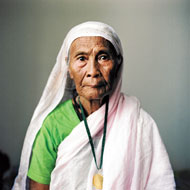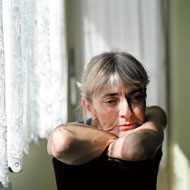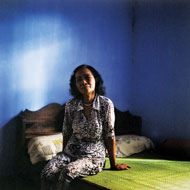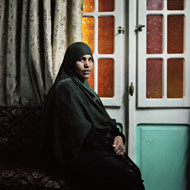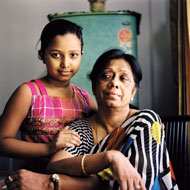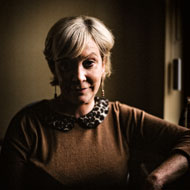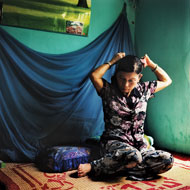 |
 |
||||||||||||||
| features Fama’s Market A Way Out of Germany Refugee Doctors at TuftsAll Is Not Lost A Woman’s War think tank wellness planet tufts newswire the big day departments |
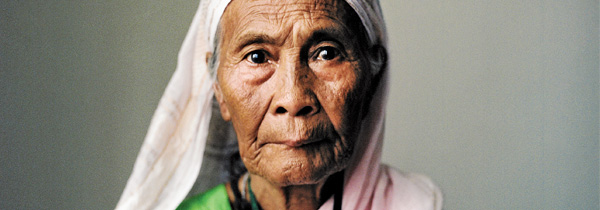
A Woman’s War
Some of the world’s neglected female veterans tell their storiesWith the sun slipping from the sky, Rabeya Khatun gathers herself quietly in the corner of the sofa and asks me why I have come to Barisal, Bangladesh. “I want to learn about what happened to you in 1971,” I say. I ask her how the Liberation War has affected her life. Looking down at her hands, she begins a story she has told only a handful of times before. I watch as the war opens in front of her. Her tale gains momentum, twisting from her childhood to her home life to the battlefield. Her voice becomes shrill and she leaps up, bending over, motioning how Pakistani soldiers held her back as they killed her son. The diary she kept during 1971 shakes in her grasp as she sings a few lines from it, songs from the war camps. Her voice breaks at the melody’s end.
Since graduating from Tufts in 2010, I have been working on a photography and oral history project, A Woman’s War, which documents the lives of women engaged in recent conflicts worldwide, as well as their struggle for justice, rights, and their identity as female fighters. The journey has led me to five countries and the stories of 116 women, including revolutionaries of Egypt’s recent uprising, members of the North Vietnamese Army, Protestant and Catholic women of the Troubles in Northern Ireland, and freedom fighters of the Bangladesh Liberation War. Most recently, I traveled to Bosnia on the Tim Hetherington Grant from Tufts Institute for Global Leadership to document the stories of women on all sides of the 1992–1995 Bosnian War.
A woman’s war is distinct. She not only has to be a fighter, but also is expected to maintain or return to her traditional role as a mother, wife, caregiver, and anchor of the family. Women in recent conflicts have served as armed combatants, spies, nurses, organizers, administrators, and weapons smugglers. They have also suffered war’s consequences: psychological trauma, physical debilitation, displacement, widowhood, rape, and the destruction of their homes and livelihoods.
Leaving the battlefield behind, however, has not meant the end of the fight for these women. In many countries, female fighters have been forced to conceal or ignore their histories in order to protect their dignity and livelihoods. Many have found themselves cast out of their families, often stigmatized and unable to find a suitor. The struggles of women, both during and after the war, remain largely unrecorded and unrecognized.
During my work on this project, the debate over women in the American military has come to the fore, and this has compelled me to bring the work home to the United States, with the support of the APA/Lucie Foundation Professional Scholarship. Although the Pentagon’s lifting of the ban on women in combat roles will open hundreds of thousands of positions to women, female troops in Afghanistan and Iraq have for the past decade faced the same stresses of trauma and redeployment as their male counterparts. Compounding the damage, military sexual trauma is rampant—reported by forty-five percent of servicewomen in an Institute of Medicine study. Female veterans make up some ten percent of the homeless population. This project will document the struggles of female veterans as they cope with the aftermath of their service.
Though the locales and conflicts within its scope vary greatly, A Woman’s War looks at vital issues that cut across time and place. These women’s families, communities, and nations need to acknowledge their stories. Only then will the countries—and the women who have given so much to them—find justice and peace.
Elizabeth D. Herman, A10, is a freelance photographer and researcher based in New York City. See more of her work at elizabethdherman.com.
